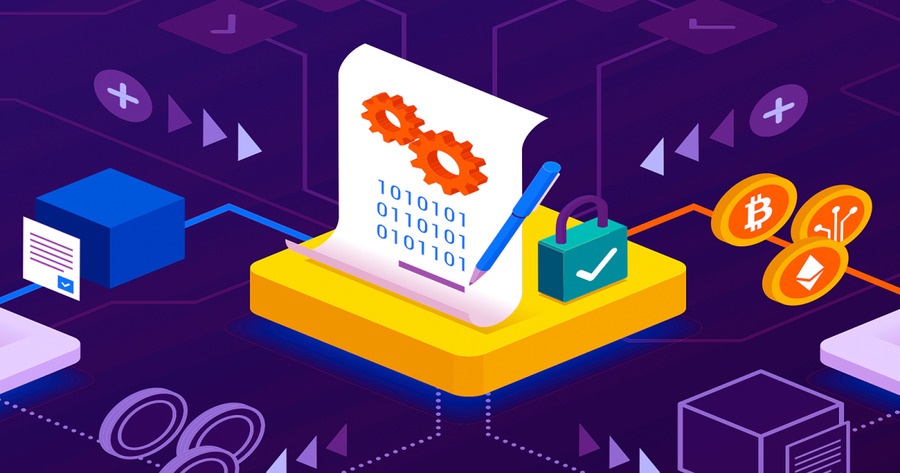In today’s digital age, technological advancements have revolutionized the way we conduct business and interact with each other. One such innovation is the introduction of smart contracts, which offer a wide range of benefits across various industries. Smart contracts, built on blockchain technology, enable secure and automated execution of agreements without the need for intermediaries. In this article, we will explore the advantages of using smart contracts in different sectors and how they are transforming traditional processes.
Introduction to Smart Contracts
Before diving into the advantages of smart contracts, let’s define what they are and provide a brief explanation of blockchain technology. They are self-executing contracts with the terms of the agreement directly written into lines of code. These contracts automatically execute actions when predefined conditions are met. Blockchain, on the other hand, is a decentralized and transparent digital ledger that records transactions across multiple computers.
Advantages of Smart Contracts in Industries

Smart contracts bring numerous advantages to various industries, enhancing transparency, efficiency, and security while reducing costs. Let’s explore these advantages in detail:
- Transparency and Efficiency: One of the key benefits of smart contracts is their ability to provide transparency and improve efficiency. As the terms of the contract are encoded in a distributed ledger, all parties involved can access and verify the information, eliminating the need for intermediaries. This transparency reduces the chances of fraud and ensures that all parties have a shared understanding of the agreement.
- Cost Reduction: They have the potential to reduce costs in different industries significantly. By removing intermediaries and automating contract execution, businesses can eliminate manual and time-consuming processes. This automation reduces administrative costs, minimizes errors, and speeds up transaction times, resulting in cost savings for companies.
- Enhanced Security: Traditional contracts are prone to fraud, tampering, and unauthorized modifications. Built on the immutable nature of blockchain technology, they offer enhanced security. The cryptographic algorithms used in blockchain ensure that the contract terms are secure and cannot be altered without the consensus of the network participants. This feature provides high trust and eliminates the need for intermediaries to validate transactions.
- Automation and Accuracy: They enable automation of contract execution, ensuring accuracy and eliminating the risk of human error. By using predefined conditions and triggers, they can automatically execute actions and enforce the terms of the agreement. This automation reduces the need for manual intervention, streamlining processes and increasing efficiency. Additionally, since they are executed based on predefined conditions, there is no room for misinterpretation or subjective judgment, ensuring accuracy in the execution of contractual obligations.
- Streamlined Processes: They streamline processes by providing a standardized, consistent framework for executing agreements. With traditional contracts, each party may have its own interpretation of the terms and conditions, leading to delays and disputes. They eliminate this ambiguity by using predefined and transparent rules. This streamlining of processes reduces bottlenecks, accelerates decision-making, and improves overall productivity.
Smart Contracts in Finance Industry
The finance industry has embraced smart contracts due to their potential to revolutionize banking, insurance, and supply chain finance.
- Use cases in banking: They can simplify and automate various banking processes, such as loan origination, fund transfers, and cross-border payments. By eliminating the need for intermediaries, they can reduce transaction costs, enhance security, and expedite settlement times.
- Insurance industry applications: They can automate insurance claims and policy management, ensuring faster and more accurate processing. Claims can be automatically verified and settled based on predefined conditions, reducing the time and complexity involved in traditional claim processes.
- Supply chain finance: They can facilitate efficient supply chain financing by automating payment settlements and verifying the delivery of goods. This reduces the risk for financiers and provides transparency and visibility into the supply chain process.
Smart Contracts in Real Estate Industry
The real estate industry is another sector that can benefit greatly from the implementation of smart contracts.
- Property ownership and transfer: They can streamline property ownership and transfer by automating the verification of title deeds, executing transfer agreements, and facilitating payment settlements. This reduces the need for manual paperwork and reduces the chances of fraud or disputes.
- Rental agreements and lease management: They can simplify rental agreements by automating rent payments, ensuring timely reminders, and facilitating automatic lease renewals. This provides convenience for both landlords and tenants, eliminating the need for manual monitoring and paperwork.
- Title and escrow services: They can automate title and escrow services by securely storing and transferring ownership records. This reduces the risk of fraudulent transactions and provides a transparent and auditable trail of property ownership history.
Smart Contracts in Healthcare Industry
In the healthcare industry, smart contracts have the potential to revolutionize various aspects of healthcare management.
- Medical records management: They can securely store and manage electronic medical records, ensuring data privacy and interoperability across different healthcare providers. Patients can control access to their records and grant permission to healthcare providers as needed.
- Clinical trials and research: They can streamline the management of clinical trials by automating consent processes, ensuring compliance with protocols, and facilitating secure data sharing between research organizations. This reduces administrative burden, enhances data integrity, and accelerates the pace of medical research.
- Patient consent and data privacy: They can enable patients to have control over their consent preferences and ensure that their personal health information is accessed and shared only as per their consent. This enhances data privacy and empowers patients to participate in their healthcare decision-making actively.
Smart Contracts in Supply Chain Industry
The supply chain industry can benefit significantly from the implementation of smart contracts, bringing transparency and efficiency to complex supply chain processes.
- Tracking and tracing goods: They can enable real-time tracking and tracing of goods throughout the supply chain, providing visibility into the movement, storage, and conditions of products. This reduces the risk of counterfeit goods, enhances product safety, and improves supply chain integrity.
- Inventory management: They can automate inventory management by automatically updating inventory levels, triggering reorders, and facilitating seamless communication between suppliers and retailers. This ensures efficient inventory control, reduces stockouts, and optimizes supply chain operations.
- Supplier management and payment: They can streamline supplier management by automating supplier onboarding, contract execution, and payment settlements. This improves transparency, reduces the risk of errors or delays in payments, and strengthens supplier relationships.
Smart Contracts in Legal Industry
The legal industry is witnessing the transformative power of smart contracts in various areas.
- Contract management and enforcement: Smart contracts can revolutionize contract management by automating the execution, enforcement, and fulfillment of contractual obligations. This reduces the need for manual contract reviews, minimizes the risk of disputes, and ensures timely performance of contractual terms.
- Intellectual property rights protection: They can enhance the protection of intellectual property rights by providing a decentralized and transparent platform for registering, licensing, and enforcing copyrights, patents, and trademarks. This eliminates the need for intermediaries and reduces the risk of infringement or unauthorized use of intellectual property.
- Dispute resolution: They have the potential to simplify and expedite the process of dispute resolution. By automating the execution of dispute resolution clauses and incorporating predefined rules, They can enable faster and more efficient resolution of disputes, reducing the burden on the legal system.
Conclusion
Smart contracts have emerged as a revolutionary technology with the potential to transform various industries. Their advantages, including transparency, efficiency, cost reduction, enhanced security, and streamlined processes, make them an attractive option for businesses across sectors. From finance and real estate to healthcare, supply chain, legal, energy, and government services, smart contracts offer innovative solutions and improvements. As industries continue to explore and adopt this technology, we can expect to see further advancements and the realization of its full potential.
FAQs
1. Are smart contracts legally binding?
Yes, smart contracts are legally binding. Once the terms and conditions are coded into a smart contract and agreed upon by the involved parties, the contract becomes immutable and self-executing. It enforces the agreed-upon conditions automatically, eliminating the need for intermediaries and ensuring that the terms are upheld.
2. How secure are smart contracts?
Smart contracts are built on blockchain technology, which provides a high level of security. The decentralized nature of blockchain ensures that the contract data is stored across multiple computers, making it difficult for hackers to tamper with or alter the contract. Additionally, the use of cryptographic algorithms ensures that the contract terms and transactions are secure and cannot be easily compromised.
3. Can smart contracts be customized to specific industry needs?
Yes, smart contracts are highly customizable. They can be tailored to meet the specific requirements of different industries and use cases. The flexibility of smart contract programming languages allows developers to create smart contracts that address the unique needs and complexities of various industries, ensuring efficient and effective automation of processes.
4. Are there any limitations or challenges with smart contracts?
While smart contracts offer numerous advantages, there are some limitations and challenges to consider. One challenge is the potential for coding errors or vulnerabilities in the smart contract code, which could lead to unintended consequences or security breaches. Additionally, the adoption of smart contracts requires a certain level of technical expertise and infrastructure, which may pose challenges for organizations that are not technologically advanced.
5. How are disputes resolved in smart contracts?
Dispute resolution in smart contracts can be addressed through predefined clauses and mechanisms coded into the contract. These clauses outline the steps to be taken in case of a dispute, such as mediation or arbitration. By incorporating dispute resolution processes into the smart contract, parties can avoid lengthy and costly legal proceedings, streamlining the resolution process.

